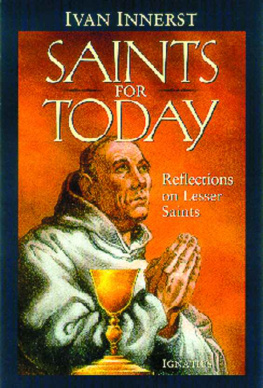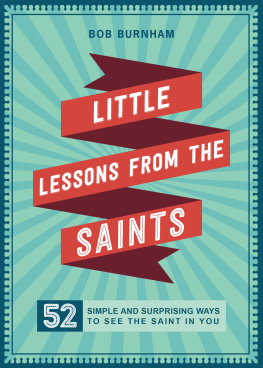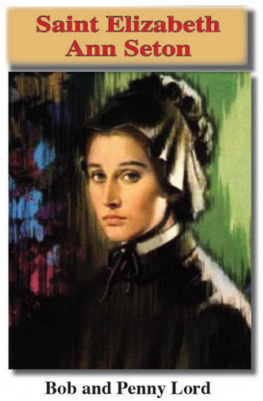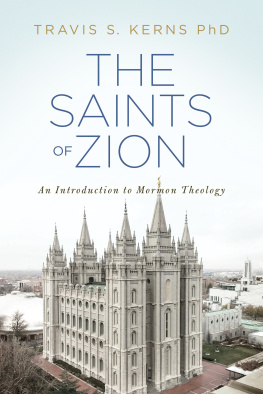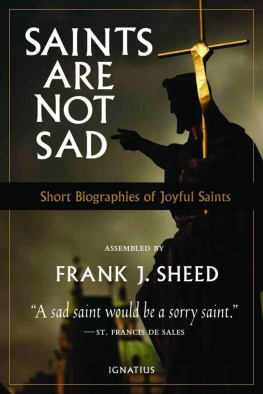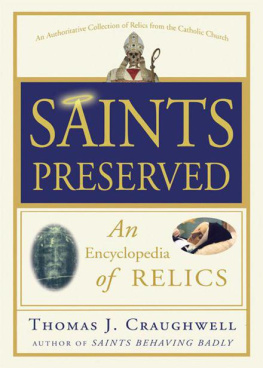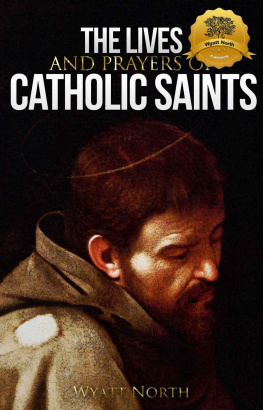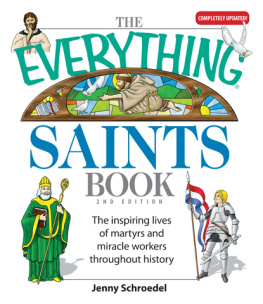SAINTS FOR TODAY
IVAN INNERST
SAINTS FOR TODAY
Reflections on lesser saints
IGNATIUS PRESS SAN FRANCISCO
Cover art by Christopher J. Pelicano
Cover design by Riz Boncan Marsella
2000 Ignatius Press, San Francisco
All rights reserved
ISBN 978-0-89870-782-3 (PB)
ISBN 978-1-68149-419-7 (E)
Library of Congress catalogue number 99-68077
Printed in the United States of America
For my wife, Betty,
our children and grandchildren
The saints included within these pages are not to be thought of as lesser in holiness, or less deserving of veneration, than others of their sanctified communion. They simply are generally less well known than those saints for whom are reserved the major feasts. Yet in each case they have much of value to say for the Church, and to the world, today .
Contents
THE CHOICE
Ralph Milner
T he Communion of Saints has never been more indispensable for the safe passage of the Church than it is today, when the Barque of Peter is besieged by such heavy seas from without and threatened by mutiny from within.
During those tempest-tossed periods in her earthly voyage, the Church has always turned, as to a compass, to her saints. And should certain times call for the support or the assistance of particular saints, what a richly diverse company she has from which to choose!
The saints would appear to share but a single trait: holiness. For the rest, their very appeal may He at least somewhat in their unlikeness. They have been scholars and slaves, kings or queens and beggars, old men and young girls, the gregarious and solitaries who have dwelt in deserts and caves, the golden-tongued and those vowed to silence, the eccentrics and the wholly mainstream.
Who then might we pose as one saint for now?
There is a sanctified soul I propose who is so obscure he is not even granted his own special entry in Alban Butlers Lives of the Saints but must rest content with being included in the company of Blessed Roger Dickenson and his Companions. This man bears the unceremonious name of Ralph Milner, He was English and lived in the sixteenth century, the heralded Elizabethan Age in England, a Renaissance period of Shakespearean grandeur, when Catholics, however, were not tolerated, and more than a few now beatified or canonized were hunted down, often tortured and put to death.
Even more important for us moderns, Milner was an illiterate farmer. He was a Protestant who, impressed by the lives of those Catholics he observed, converted to the Catholic faith. He was found out and imprisoned almost at once, after his First Communion, but was later, on more than one occasion, set free, each time only to be jailed again. A more prudent man might then have let well enough alone and remained free. But saints are not known for practicing this sort of prudence. Each time upon his release, Milner worked to gain assistance for those Catholics still imprisoned or helped to conceal the missionary priests who were forced underground to survive. He was arrested a last time with one such priest, named Roger Dickenson, with whom he was brought to trial and whose feast day he shares on July 7 in the calendar of saints.
It is here, inside a sixteenth-century trial chamber, that we must pause to marvel today at such a sight as that which unfolded, where was displayed so great a show of loyalty and devotion to the Church and to Rome. The judge took pity on Milner, now elderly and a father of eight, and made him an offer so seemingly inoffensive, so benign, as to appear wholly acceptable for one whose very life hung on his answer. Milner, the judge ruled, had only to walk through the door, pass along the street, and enter a nearby Anglican church. This, he said, would constitute an act of reconciliation, and Milner would be at liberty to return to his family. That was to be all, the whole of it: a few short steps, the performance of an altogether symbolic act, and his life would be spared.
The question raised is an insistent one, and utterly human. Why could not Milner have agreed to the judges well-meaning proposal yet remained a secret Catholic in his heart? In modern parlance, why should he have not accepted the offer while crossing his fingers behind his back? But the outcome of the story is, of course, evident. The man was a saint, after all, and there are no secret Catholics within that communion. Ralph Milner chose rather to stand steadfast inside that chamber, and he was executed with Father Dickenson on July 7, 1591. He was quoted as responding to the judge: Would your lordship then advise me, for the perishable trifles of this world, or for a wife and children, to lose my God? No, my lord, I cannot approve or embrace a counsel so disagreeable to the maxims of the Gospel.
The awesome choice made by Ralph Milner seems the greatest folly for those of us who live all these four hundred years later. It is somehow beyond our poor power to comprehend, creatures as we are of this more enlightened, religiously tolerant age. Yet it ought not to be taken casually today by the faithful of the Western world, in this time of cafeteria Catholicism, of freewheeling theology, of dissident clergy within the Church, of a too-often diffident laity. Nor should his words fall meaninglessly on the ear of the lukewarm within the fold of the Church: those who would scarcely think twice before performing so otherwise innocent an act as to step out one door and in through another, should that move spare for them the perishable trifles of this world, and even though it cost them their Catholic faith.
This has nothing to do with a call for a return to the tooth-and-claw internecine church warfare of former times, which all civilized nations now deplore. Protestants in such societies no longer execute Catholics for being Catholic, nor do Catholics put to death Protestants for their reformist beliefs. It has everything to do with restoring among present-day Catholics an enduring loyalty to their Church and her teaching at one more period in her history when that Church is so beset both from within her ranks and from without by the secular world.
There is an added element to the story of this saint that we would today ignore at our spiritual peril. As has been noted, Milner was an illiterate farmer. Then should we not further ponder over how it is so much within our urban culture, among the sophisticated elite of our great cities and inside the halls of academe, that the secularism and heterodoxy we observe all around us have taken the deepest root? Is it not there that the believing, traditional Catholic is looked upon as little more than a well-meaning but misguided fool, blind to the ways of the modern world and blundering down some medieval path that leads backward into a discarded history?
That being the case, we would do well to rethink how we might better follow the lead of the illiterate farmers of this day and age who, in their simplicity of life and thought, their elemental wisdom and courage, could teach us a great deal indeed about the timeless qualities of the faith. They are, after all, as we have been told, the little ones to whom have been confided the mysteries of the Kingdom.
It has been rightly declared that the history of the Church is the history of her saints. We might therefore ask, caught within the throes of the present age: Blessed Ralph Milner, pray for us.
THE REAL PRESENCE
Paschal Baylon
T he sight was an odd one to behold when it happened, and on holy ground. So unrestrained an outpouring of devotion was scarcely ordinary behind those walls, and surely it would have been thought to border on the eccentric.
As one friar watched, from where he was himself unobserved, the second friar performed an elaborate dance, moving his body back and forth, then leaping high into the air. But this was no simple show of agility. Nor had it anything to it of the artistic creation: the practiced moves, the graceful step. There was nothing of a choreographed stage performance to it, to be seen within a darkened theater.
Next page
